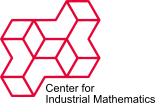Prof. Dr. Andreas Rademacher
Leader of WG Modelling and Scientific ComputingMember of the high-profile-area MAPEX.
CV
University Education
| 10.02.2016 | Habilitation in mathematics, Technische Universität Dortmund |
| 11.09.2009 | Conferral of the Doctor of Science degree (Dr. rer. nat.), Technische Universität Dortmund |
| 30.03.2005 | Degree (Diplom) in mathematics, University of Dortmund |
| 09.08.2002 | Pre-degree (Vordiplom) in mathematics, University of Dortmund |
| 16.06.2000 | General qualification for university entrance (Abitur), Franz-Stock-Gymnasium, Neheim-Hüsten |
Professional Career
| Since01.04.2020 | Professor for Mathematical Modelling at Zentrum für Technomathematik, University of Bremen |
| 06.2016-03.2020 | Research associate with civil servant status (Akademischer Oberrat), Faculty of Mathematics, Technische Universität Dortmund |
| 04.-09.2013 | Replacement of a professorship, Mathematical Institute, University of Cologne |
| 12.2009-05.2016 | Research associate with civil servant status (Akademischer Rat), Faculty of Mathematics, Technische Universität Dortmund |
| 04.2005-11.2009 | Research associate (Wissenschaftlicher Angestellter) in research and teaching, Chair X for Scientific Computing, Technische Universität Dortmund |
Research Areas
- Mathematical Modeling
- Adaptive finite elements
- Scientific Computing
Leader of Projects
- Increased throughput of laser-induced shock wave indentation testing through an adapted measurement strategy and machine learning based data evaluation (01.12.2024 - 30.05.2027)
- Parameter Identification for Signorini problems with friction (01.04.2023 - 30.09.2025)
- Parameter Identification on Time-Dependent Domains using Adaptive Finite Cell Methods (01.11.2022 - 31.10.2025)
- Adaptive mixed finite cell methods for elliptic problems (01.04.2022 - 31.03.2025)
- Inverse methods for ice sheet surface elevation changes with an application to West Antarctica (01.06.2021 - 31.05.2024)
- Simulation-based NC-shape grinding as a finishing operation of coated deep drawing tools (01.01.2015 - 15.06.2018)
- Space-time-FEM for thermomechanical coupled contact problems (01.07.2014 - 30.06.2015)
- Adaptive Optimal Control of Variational Inequalities in Computational Mechanics (15.07.2012 - 30.06.2015)
- Development of model adaptive simulation techniques for forming processes of complex functional components with complicated design details (01.01.2012 - 31.12.2016)
- Numerical analysis and efficient implementation of complex FE models of production processes based on the example of the deep hole drilling process (01.05.2010 - 30.04.2017)
Courses (Selection)
- Numerical Methods for Partial Differential Equations (Wintersemester 2025/2026)
- Numerik 1 (Wintersemester 2025/2026)
- Mathematische Modellierung (Wintersemester 2025/2026)
- Seminar on Numerics of Partial Differential Equations (Wintersemester 2025/2026)
- Numerical Methods for Nonlinear Partial Differential Equations (Sommersemester 2025)
betreute/begutachtete Dissertationen (Selection)
- Adaptive Finite-Elemente-Methoden für thermoplastische Kontaktprobleme (Ullrich Ralf Friedrich-Wilhelm Heupel)
- Ein allgemeines Konzept für Adaptive Finite Elemente Methoden bei modifizierten diskreten Formulierungen (Dustin Kumor)
- Adaptive unstetige Finite Elemente Methoden für elastoplastische Kontaktprobleme (Korosh Taebi)
- Adaptive Finite Element Methods for contact problems embedded in a Fictitious Domain - Simulation and Optimal Control (Korinna Rosin)
- Finite Elemente Methoden höherer Ordnung für reibungsbehaftete elasto-plastische Mehrkörperkontaktprobleme - Fehlerkontrolle, adaptive Methoden und effiziente Lösungsverfahren (Hannah Frohne)
Theses (Selection)
- Gradient-based Optimization of Parameterized CAD Geometries with PDE Constraints (Mauro Dunker)
- Synthetic Sample Generation and Anomaly Detection for Surface Defects (Theresa Sauerland)
- Effiziente Lösungsalgorithmen für Finite-Elemente-Diskretisierungen von hyperelastischen Kontaktproblemen (Marie Kolumbe)
- Vergleich verschiedener Optimierungsalgorithmen für die inverse Bestimmung des basalen Reibparameters (Hendrik Jesse)
- Simulation und paralleles Lösen von gekoppelten PDE-Systemen in verschiedenen Teilgebieten mit FEASTFLOW unter Verwendung spezieller Randbedingung am Interface (Peter Bockhorst)
Publications (Selection)
- A. Osmers, A. Rademacher, A. Schröder.
Goal-oriented Adaptive Finite Cell Methods.
ENUMATH 2023, 04.09. - 08.09.2023, Lisbon, Portugal.
- L. Banz, A. Rademacher, D. Thiede.
Goal-Oriented Error Estimates for Adaptive Mixed Finite Element Methods.
ENUMATH 2023, 04.09. - 08.09.2023, Lisbon, Portugal.
- D. Nganyu Tanyu, I. Michel, A. Rademacher, J. Kuhnert, P. Maaß.
Parameter Identification by Deep Learning of a Material Model for Granular Media.
GEM -- International Journal on Geomathematics, 15(13), 2024.DOI: 10.1007/s13137-024-00253-0
online at: https://arxiv.org/abs/2307.04166 - L. Höyns, T. Kleiner, F. Kranz, T. Meyer, A. Rademacher, M. Wolovick, A. Humbert.
On the Identification of the Basal Drag Parameter in Ice Sheet Models Using L-Curves.
GAMM 94th Annual Meeting of the International Association of Applied Mathematics and Mechanics, 01.12.2024, Magdeburg, Germany.
- L. Höyns, T. Kleiner, A. Rademacher, M. Rückamp, M. Wolovick, A. Humbert.
Improved basal drag of the West Antarctic Ice Sheet from L-curve analysis of inverse models utilizing subglacial hydrology simulations.
EGUsphere, , 2024.


